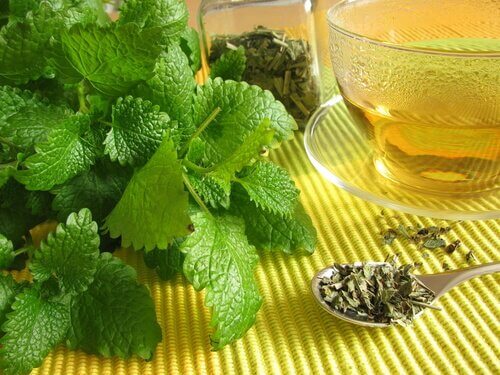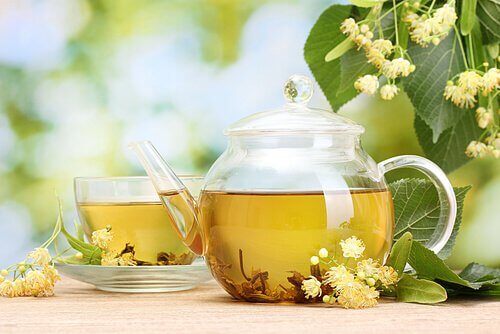The Best Teas that May Help Regulate Nerves and Anxiety


Written and verified by psychologist Valeria Sabater
Life can sometimes bring you down. This may cause nerves and anxiety, your body’s reaction to stimuli that threaten the cells of your brain.
While it’s true that both stress and anxiety at controlled and moderate levels can help you face the difficulties of everyday life, too much of them can affect your well-being.
If you notice that you’re losing control and certain symptoms like rapid heartbeat, dizziness, or indigestion have manifested, don’t hesitate to talk to your doctor. The help of a professional is needed in most of these cases.
Meanwhile, you can resort to some simple remedies at home. People find relief in teas when they’re experiencing moderate stress and anxiety levels.
We invite you to read on to discover some teas that may help regulate nerves and anxiety!
Hawthorn for calm nerves and anxiety
Hawthorn is a beneficial herb that regulates blood pressure. It tells your body to relax, may help improve blood circulation, and may help optimize your heart rhythm.
It’s excellent for when you’re experiencing mild anxiety or on days when you’re more nervous than usual.
How to make it and drink it
- Natural experts will tell you that it’s best to take it in a tincture. You can find this in herbalist shops and it’s usually very effective.
- Dissolve two drops of hawthorn tincture in a cup of water or natural juice.
- Drink one cup a day.
Contraindications
- If you’re already taking medications to treat heartbeat irregularities or high blood pressure, don’t use hawthorn.
- Avoid its use if you’re pregnant.
- Don’t abuse tinctures because they contain trace amounts of alcohol and can have side effects.
See also: 5 Foods that Reduce Stress
Lemon balm tea for better sleep

Lemon balm is one of the better-known plants for its relaxing action and relief of moderate stress, insomnia, or anxiety levels.
In addition, lemon balm may help fight spasms, helping to alleviate muscle tension and the nerves that can upset your stomach.
How to make it and drink it
- You can drink two cups of lemon balm tea a day. It’s especially helpful if you take it before bed.
- Heat one cup of water (200ml) and add a teaspoon of lemon balm (5 g). Don’t forget to sweeten it with honey.
Contraindications
- If you’re pregnant, you should avoid consuming this tea without first consulting with your doctor.
- Never take lemon balm tea if you need to drive or operate machinery.
Basil for nervous stomach
A lot of people, when they feel nervous or anxious, feel like all their nerves are pooled in their stomach.
Suggesting drinking basil tea every day to fight this problem might surprise you since you likely only think of basil as an aromatic herb for cooking.
But basil and its essential oil are actually very relaxing and may help relieve stomach pain and improve your digestion. Try making a basil tea after every meal.
We recommend you read: 7 Ways to Relieve Stress When you Get Home
How to make it
- Simply infuse a teaspoon of basil and a cup of water. Let it simmer for 10 minutes and steep another 10.
- If you sweeten it with a little bit of honey, you’ll really enjoy the results.
Contraindications
- If you suffer from gastritis or Crohn’s disease it’s best to avoid basil because the essential oils can cause adverse effects.
- Don’t drink more than one cup a day or extend this treatment for more than 10 days. It’s best to take basil when you feel intense stomach pain due to nerves (and you’re sure it’s not due to gastritis).
Linden tea for nerves and anxiety

Linden or basswood tea is a great way to help relieve common nerves or moderate anxiety. It may help relieve stress and upset stomach, promote relaxation and relieve headaches.
How to make it and drink it
- Linden tea has fewer side effects, which means you can drink up to three cups a day as needed. Moreover, it can become something you include in your day to day routine.
- All you need to do is boil a cup of water and add a teaspoon of linden.
- Always sweeten this with honey to enhance its therapeutic and sedative effects. You’ll love how much calmer it may make you feel.
Contraindications
- As we already mentioned, linden is a natural plant that has few side effects. But if you’re pregnant or taking heart medications, it’s always best to consult with your doctor first.
All cited sources were thoroughly reviewed by our team to ensure their quality, reliability, currency, and validity. The bibliography of this article was considered reliable and of academic or scientific accuracy.
- Craske, M. G., Roy-Byrne, P. P., Stein, M. B., Sullivan, G., Sherbourne, C., & Bystritsky, A. (2009). Treatment for anxiety disorders: Efficacy to effectiveness to implementation. Behaviour Research and Therapy. https://doi.org/10.1016/j.brat.2009.07.012
- Aguirre-Hernández E, Martínez AL, González-Trujano ME, Moreno J, Vibrans H, Soto-Hernández M. Pharmacological evaluation of the anxiolytic and sedative effects of Tilia americana L. var. mexicana in mice. J Ethnopharmacol. 2007;
- Cases J, Ibarra A, Feuillère N, Roller M, Sukkar SG. Pilot trial of Melissa officinalis L. leaf extract in the treatment of volunteers suffering from mild-to-moderate anxiety disorders and sleep disturbances. Med J Nutrition Metab. 2011;
- Nabavi SF, Habtemariam S, Ahmed T, Sureda A, Daglia M, Sobarzo-Sánchez E, et al. Polyphenolic composition of Crataegus monogyna jacq.: From chemistry to medical applications. Nutrients. 2015.
- Gutiérrez, S. L. G., Chilpa, R. R., & Jaime, H. B. (2014). Medicinal plants for the treatment of “nervios”, anxiety, and depression in Mexican Traditional Medicine. Brazilian Journal of Pharmacognosy. https://doi.org/10.1016/j.bjp.2014.10.007
This text is provided for informational purposes only and does not replace consultation with a professional. If in doubt, consult your specialist.








